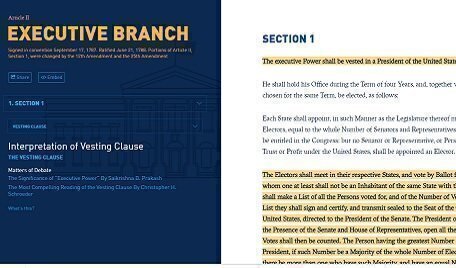On this Presidents Day, it’s time to look at the duties and responsibilities assigned by the Constitution to the President of the United States.
 Article II of the Constitution deals directly with the job of being President, who can qualify, how a President is elected, the President’s direct and implied powers, and how a President can be removed from office by Congress. After 1787, constitutional amendments were focused on the timing of presidential terms, changing the presidential electoral voting process, dealing with the inability of a President or President-elect to hold office, and presidential term limits.
Article II of the Constitution deals directly with the job of being President, who can qualify, how a President is elected, the President’s direct and implied powers, and how a President can be removed from office by Congress. After 1787, constitutional amendments were focused on the timing of presidential terms, changing the presidential electoral voting process, dealing with the inability of a President or President-elect to hold office, and presidential term limits.
Our Interactive Constitution project features leading scholars of differing viewpoints agreeing on the basic facts and matters of debate about key Article II clauses. Here is a list of those common interpretations and matters of debate. The highlight's below come from our series of essays on Article II.
The Vesting Clause
Article II, Section 1 begins: “The executive power shall be vested in a President of the United States.” Saikrishna B. Prakash and Christopher H. Schroeder look at two important questions. First, does the term “executive power” identify a set of powers beyond those expressly identified in the Constitution, but which are nonetheless given to the President by virtue of the Vesting Clause? And, by “vesting” powers in a singular executive, does the Vesting Clause establish that the President may exercise those powers by himself, without interference by Congress, and, concomitantly, does it give the President the authority to direct and supervise any federal official involved in such matters?
The Commander-In-Chief Clause
The Commander in Chief Clause of Article II, Section 2 provides that “The President shall be Commander in Chief of the Army and Navy of the United States, and of the Militia of the several States, when called into the actual Service of the United States.”
Michael D. Ramsey and Stephen I. Vladeck examine the long-running debate about the clause, pointing to Supreme Court Justice Robert Jackson’s classic comments: “These cryptic words have given rise to some of the most persistent controversies in our constitutional history,” with Presidents at various points claiming that it “vests power to do anything, anywhere, that can be done with an army or navy.”
Treaty and Appointments Power
John O. McGinnis and Peter M. Shane look at how treaty making is a power shared between the President and the Senate, and how Article II, Section2, deals with the subject of official appointments. “Perhaps the greatest source of controversy regarding the Appointments Clause, however, surrounds its implications, if any, for the removal of federal officers,” they write.
Article II, Section 3
Article II, Section 3 both grants and constrains presidential power. This Section invests the President with the discretion to convene Congress on “extraordinary occasions,” a power that has been used to call the chambers to consider nominations, war, and emergency legislation. It further grants the President the authority to adjourn Congress whenever the chambers cannot agree when to adjourn, a power that no President has ever exercised. William P. Marshall and Saikrishna B. Prakash also explain the Take Care Clause, arguably a major source of presidential power because it seemingly invests the office with broad enforcement authority, but it also serves as a major limitation on that power because it underscores that the executive is under a duty to faithfully execute the laws of Congress and not disregard them.
The Impeachment Clause
The final section of Article II, which generally describes the executive branch, specifies that the “President, Vice President and all civil Officers of the United States” shall be removed from office if convicted in an impeachment trial of “Treason, Bribery, or other high Crimes and Misdemeanors.” Neil J. Kinkopf and Keith E. Whittington write about how much of the controversy surrounding the Impeachment Clause has revolved around the meaning of “high Crimes and Misdemeanors,” a phrase that is unique to the impeachment context.







